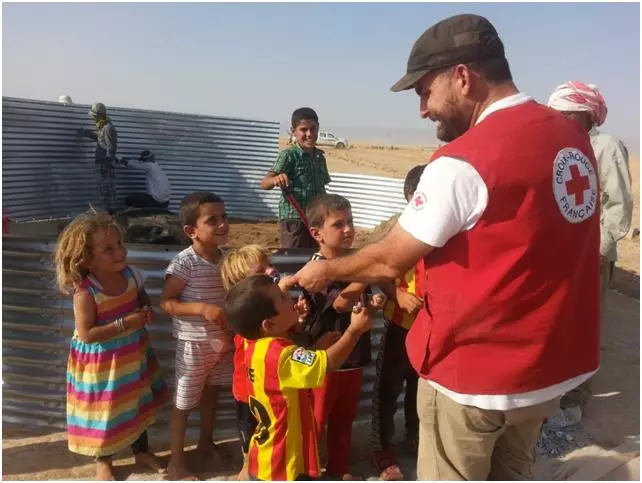
Emergency
Place:
Iraq
Date:
August - September 2014
Type of intervention:
Water
Installing equipment
Support for operations
Main partners
French Red Cross
Ministry of Foreign Affairs
”The French Red Cross, a partner of the Veolia Foundation, issued a preliminary alert at the start of the summer. It was the announcement of a forthcoming deployment of Emergency Response Unit teams on the ground. The war against Daech (Islamic State) has led to population displacement and thousands of refugees have been arriving in Iraqi Kurdistan. In the past few weeks a humanitarian response, in which the Veolia Foundation has been involved, has been drawn up. I was called on in my capacity as a volunteer who had been trained to join the ERUs that have been sent into the field.”
Gregory Gonzales, a Veoliaforce volunteer
In Iraq, the war against Daech (Islamic State) has led to population displacement and thousands of refugees arrived in Iraqi Kurdistan during the summer of 2014. France delivered by aircraft almost 20 tonnes of humanitarian aid equipment to be used for storage facilities and the provision of fresh water (tanks, water distribution manifolds, etc.), of which 12.5 tonnes were supplied by the Veolia Foundation.
The equipment on the ground was taken over by the French Red Cross, the historic partner of the Foundation in humanitarian emergencies, that was in Kurdistan to provide support to the displaced Iraqis. Several volunteers from the Veolia Foundation came in succession in August and September 2014 to help the French Red Cross teams on the ground and to make sure that the equipment sent was properly set up and installed. Once up and running, this equipment was able to supply 50,000 people with fresh water.
Constructing latrines and water supply systems
At the same time, the Veoliaforce volunteers, who followed each other out into the field, organized the supply of fresh water and the construction of latrines on around forty sites used for sheltering Iraqi refugees outside the camps. Of the 100,000 people who have been displaced, some live in refugee camps while others are taken in by the local communities and sheltered in schools, mosques, churches and buildings being put up in the surrounding areas.
Teams of builders and carpenters have been set up to pre-fabricate and install latrines. They have been recruited from among the displaced people and refugees, which has enabled paid work to be offered to those people who were required, while at the same time adapting the aid to real needs.
A partnership to strengthen humanitarian aid
On August 27, 2014, the Veolia Foundation – together with other companies like EDF and Lafarge – signed a partnership agreement with the French Minister of Foreign Affairs, which aims to improve the effectiveness of the response to emergency humanitarian situations.

